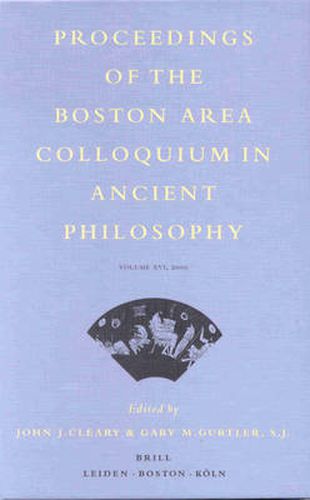Readings Newsletter
Become a Readings Member to make your shopping experience even easier.
Sign in or sign up for free!
You’re not far away from qualifying for FREE standard shipping within Australia
You’ve qualified for FREE standard shipping within Australia
The cart is loading…






This volume reflects some of the activities of the Boston Area Colloquium in Ancient Philosophy from the academic year 1999-2000. It contains seven colloquia which were hosted by different universities within the greater Boston area. The participants discuss important philosophical problems raised by the works of Plato and Aristotle, while also considering some relevant issues in modern philosophy of mind. With regard to Plato, one colloquium gives a detailed analysis of his argument for recollection in the Phaedo, while another considers the metaphysical basis for justice in the Republic, and another takes a general look at the role of techne in Platonic philosophy. Similarly, with reference to Aristotle, two colloquia provide a detailed analysis of the argument that Nous is not compounded with the body, as well as the relevance of his doctrine of Nous for modern conceptions of mind. In addition, there is a colloquium that provides a general account of the concept of law in Aristotle’s Politics, as well as a colloquium that draws interesting parallels between Aristotle and Freud.
$9.00 standard shipping within Australia
FREE standard shipping within Australia for orders over $100.00
Express & International shipping calculated at checkout
This volume reflects some of the activities of the Boston Area Colloquium in Ancient Philosophy from the academic year 1999-2000. It contains seven colloquia which were hosted by different universities within the greater Boston area. The participants discuss important philosophical problems raised by the works of Plato and Aristotle, while also considering some relevant issues in modern philosophy of mind. With regard to Plato, one colloquium gives a detailed analysis of his argument for recollection in the Phaedo, while another considers the metaphysical basis for justice in the Republic, and another takes a general look at the role of techne in Platonic philosophy. Similarly, with reference to Aristotle, two colloquia provide a detailed analysis of the argument that Nous is not compounded with the body, as well as the relevance of his doctrine of Nous for modern conceptions of mind. In addition, there is a colloquium that provides a general account of the concept of law in Aristotle’s Politics, as well as a colloquium that draws interesting parallels between Aristotle and Freud.